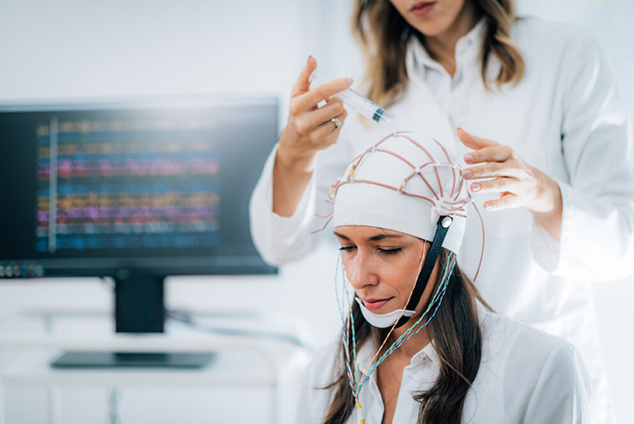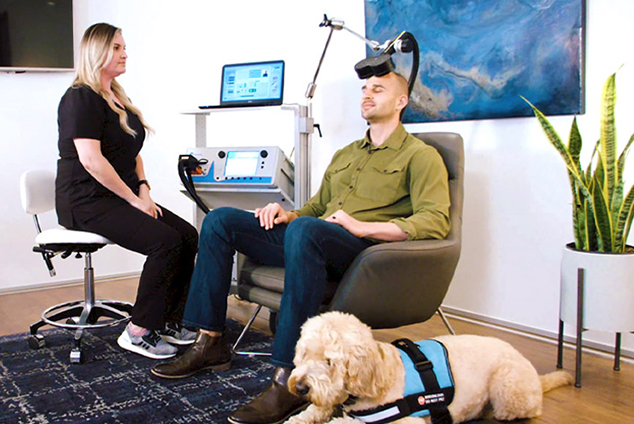Treatment for Depression, Major Depressive Disorder MDD, and Treatment Resistant Depression TRD with MeRT
This FDA-Cleared Treatment for Depression and Major Depressive Disorder (MDD) is available at the Brain Treatment Center. It’s called MeRT, Magnetic e-Resonance Therapy.
We have successfully used this treatment to treat Depression. It is non-invasive and non-pharmaceutical. It’s helpful for those who have not responded well to medications or who have suffered side effects from them.

An Entirely New Approach to the Treatment of Depression!
Dr. Cindy Huynh and Dr. Michael Do have brought a state-of-the-art technology called MeRT to Austin. We use MeRT to treat Depression, Major Depressive Disorder (MDD), and Treatment-Resistant Depression (TRD).
MeRT, which stands for Magnetic e-Resonance Therapy, uses magnetic waves to gently stimulate specific areas of the brain that are not functioning as they should be. Sophisticated imaging of your brain activity guides this treatment.
MeRT is completely painless. You are fully awake, and we use no drugs or medications. The equipment used in the MeRT process is FDA-cleared to treat Major Depressive Disorder and Drug-Resistant Depression.
MeRT can help when other treatments have been unsuccessful or when medications have hard-to-tolerate side effects.
Do You or a Loved One Suffer from Depression?

Symptoms of Depression can vary from person to person. Some cases can be very extreme. Others may experience it moving in and out. Some manage to shove it aside, but still, it is there, ready to move in when opportunity strikes. We list many of the common symptoms of Depression below.
Continued signs of Depression, untreated and not abating, can lead to further complications and worsening of symptoms and/or frequency. It is important to seek skilled help, whether with our clinic or other treatment methods.
Magnetic e-Resonance Therapy — MeRT — may provide relief and lasting betterment.
If You Suffer from Depression, MeRT Could be The Answer You Are Looking for!
Here at the Brain Treatment Center in North Austin, we offer the MeRT treatment protocols to help patients who have been suffering from Depression and Major Depressive Disorder.
The MeRT treatment process utilizes TMS (transcranial magnetic stimulation), but it is a much more individualized approach. TMS has been used for a long time to treat dysregulation within the brain. However, in and of itself, it is more of a one-size-fits-all approach to treatment since it is only able to target a single location in the brain with a single frequency, regardless of condition.
MeRT is a unique and much-improved process of utilizing TMS. By using a quantitative EEG/EKG to determine exactly what part of the brain is affected and to what degree, we can tailor treatment specifically to each individual’s needs.
“After my accident, I was withdrawn and a recluse. Work and even doing simple daily activities like buying groceries felt so overwhelming.
“I’ve been to different therapists and placed on meds, but it felt like a temporary band-aid. Then I found MeRT, and I can’t even describe how life-changing it has been. I have better focus and concentration and have been going out without that feeling of doom. I got my life back — I wish more people could hear about this treatment!”
MeRT Patient
Symptoms of Depression
- Loss of interest in activities and relationships
- Feelings of sadness, hopelessness, or emptiness
- Loss of sex drive
- Insomnia, or sleeping too much
- Emotional outbursts, even over insignificant matters
- Chronic mental and/or physical exhaustion
- Changes in appetite
- Increased anxiety
- Agitation or restlessness
- Feelings of worthlessness
- Low self-esteem
- Short-term memory loss
- Inability to think straight
- Fixating or ruminating on failures or past events
- Physical symptoms such as back pain, neck pain, or headaches with no known cause
- Chronic feelings of unhappiness
- Feeling “numb”
- Feelings of isolation
- Thoughts of suicide
- Attempts at suicide or death by suicide
What is MeRT?
MeRT, guided by very sophisticated EEG imaging, uses a magnetic coil to gently stimulate and balance the function of the brain.
The patient first undergoes a qEEG (quantitative EEG) to identify dysregulation occurring in the brain. The results will show the brain’s brainwave pattern and function. This detailed analysis allows the doctor to determine the exact neural synchronization protocol to be used for each patient. The objective is to encourage improved communication within the brain, which can lead to significant clinical improvements. *
TMS (transcranial magnetic stimulation) is an FDA-cleared method of treating Depression. TMS modulates the brain’s activity by using magnetic fields that pass through the scalp from an electromagnetic coil. However, TMS is more of one-size-fits-all approach because it only targets a single location in the brain with a single frequency.
The MeRT treatment that we use to treat patients utilizes TMS. However, it is a greatly improved process since we individualize the treatment for each patient’s condition and needs based on the qEEG results. We customize the frequency, location, and power used for each individual.
MeRT is a more evolved version of TMS since its protocol combines technologies of transcranial magnetic stimulation, quantitative electroencephalogram (qEEG), and electrocardiogram (ECG/EKG). This combination allows for treatment protocol based on each person’s unique brain pattern.
MeRT for Depression is usually four to six weeks long. Since it is a type of therapy, appointments are every day, Monday through Friday, and usually last approximately 30 minutes. Most often, the patient will begin to notice improvements in the way they feel during the first week. After going through treatment, there is not usually a need for any follow-up treatment for Depression.

EEG Brainwave Scanning

A trained neuro-technician delivers TMS as part of the MeRT treatment protocol.
If you think you might be interested in exploring MeRT, you don’t have to decide anything right away

We understand that considering a treatment that you don’t know that much about can be daunting. You may feel quite uncertain about whether this is right for you. So the first easy step is to start with a simple phone consultation with our New Patient Coordinator. Here, you can discuss your symptoms and history, ask all the questions you want, and have her explain the protocols, fees, and details of treatment.
If, after this, you are interested in taking the next step in seeing if MeRT treatment is right for you, we will initially schedule two appointments. Both appointments are about 45 minutes long.
At the first appointment, our neuro-technician will perform an EEG and an EKG. Both are simple, painless, and non-invasive tests to see exactly what is happening in your brain. At the second appointment, a few days later, when your test results are in and analyzed, you will have a one-on-one consultation with the doctor. Here, you will discuss your test results, ask any additional questions that you may have, and together determine if you (or your child, if this is about your child) are a candidate for treatment.
If you are uncertain whether MeRT is the right treatment for you, the testing and consultation will allow both you and the doctor to decide if you may benefit.
Assessment Period
If you and the doctor decide to move forward with MeRT, the next step is what we call the Assessment Period. Here, we will perform an initial period of treatment, followed by a new EEG to see if you are responding. The assessment period includes daily treatment Monday through Friday for the first week and Monday through Thursday for the second week.
During this assessment, we are looking for any clinical changes and that you are having a positive response to the treatment. You (or your child) will likely notice improvements starting to take place. Once we confirm this, you will continue treatment protocols.
Starting as a New Patient and What to Expect When Going Through Treatment

If you are uncertain whether MeRT is the right treatment for you, the testing and consultation will allow both you and the doctor to decide if you may benefit from Magnetic Resonance Therapy.
Should you decide to proceed with treatment, we will schedule you for your two-week assessment period of treatment as described above.
Daily treatment consists of sitting in a chair while the neuro-technician administers treatment from a hand-held magnet held on the scalp. This is a painless and non-invasive treatment. We administer magnetic impulses every 6-8 seconds each minute for about 30 minutes. You may feel a slight sensation while we administer treatment, but it is not uncomfortable or painful.
After going through the two-week assessment period, we usually continue MeRT for an additional 2-4 weeks (for a total of 4-6 weeks). There are cases where treatment duration may wish to be extended or where patients may want to return at a later time for a follow-up treatment session of a week or so, but this isn’t mandatory. Each individual is different, and protocols may vary. During your total treatment duration, you will have interim EEGs every 2 weeks and at the end of your treatment to monitor your progress. Once treatment is over, you and the doctor can make the determination if you need further treatment or follow-up based on your progress.